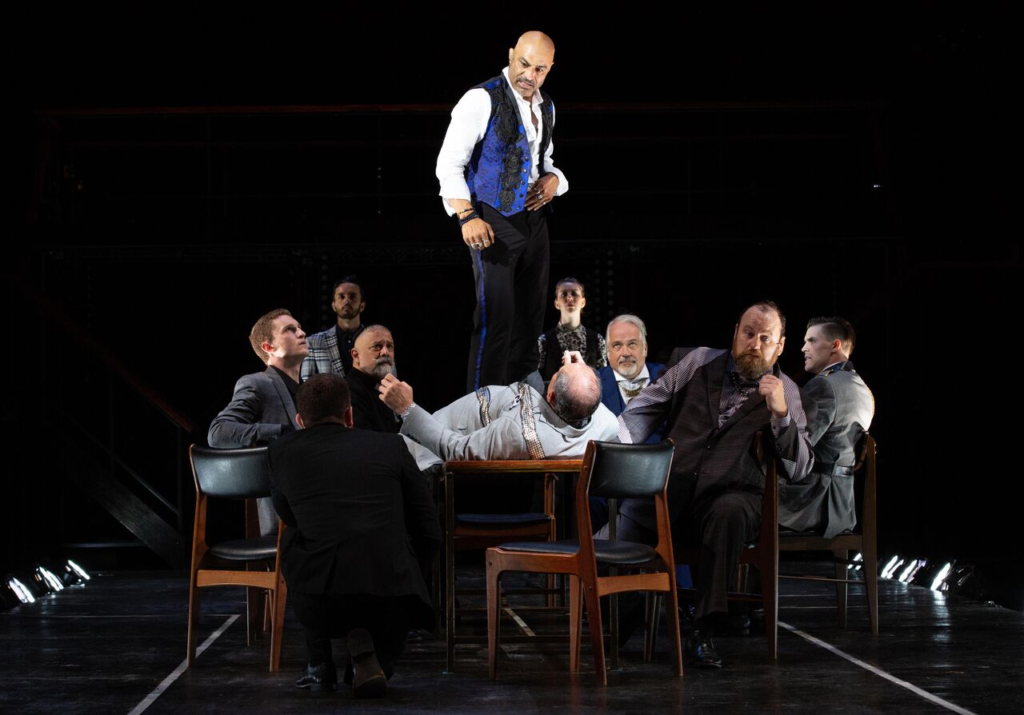
Faran Tahir (Richard III) and the cast of Richard III (photo by Evgenia Eliseeva)
Presented by the Commonwealth Shakespeare Company
Written by William Shakespeare
Directed by Steven Maler
July 18 – August 5, 2018
Parkman Bandstand
Tremont Street & Winter Street
Boston, MA 02108
CSC on Facebook
Review by Gillian Daniels
(Boston, MA) The Commonwealth Shakespeare Company brings an arresting production of Richard III to Boston’s Common. The grim story of a happily evil king is enlivened by the performance of Faran Tahir as he swaggers, lies, and simpers his way to a throne that might as well be soaked in blood. The play is grounded in real world anger toward a cartoonish villain who disintegrates into a self-doubting coward. It’s a cathartic watch, one that both moved me and concerned me in the way it compliments and comments on topical news items.
The plot is deceptively simple. Richard is a villain who does villainous things. He makes the audience his confidant as he delights in the machinations of his plans as he uses his radiant charm and deceit to pick off his enemies, fool his allies, and seduce the vulnerable widowed Lady Anne (Libby McKnight) who, thrown off-kilter by her husband’s death, hesitantly accepts his offer of marriage and seals her own fate.
I’ll admit, one of the reasons the play worked as well as it did the night I saw it was the weather. Rain fell thematically on the battle where Richard faces off against Henry, Earl of Richmond (Michael Underhill) and the hair of Queen Elizabeth (the superb Deb Martin) was caught up in the wind as she raged over the deaths of her family members. I don’t guarantee the weather to be as cooperative in other performances, but here, Mother Nature played a stunning co-stage director. Shakespeare belongs outdoors and I hope a little rain doesn’t keep curious viewers away.
Regardless of wind or the lack there of, Martin’s Elizabeth oscillates between a firestorm of anger and simmering contempt as she faces Richard. Their standoff is the crowning achievement of the second half of the play. I expected her to grab an ax and take down Richard herself. It certainly put me in mind of the recent headlines regarding children taken from immigrant parents and imprisoned by the government. The parallels to Prince Edward (Seamus Doyle) and Prince Richard (Brendan O’Brien), trapped in the Tower of London, certainly applied a lens to her performance that magnified her character’s sense of despair and white-knuckled fury.
The fantastic Bobbie Steinbach as Queen Margaret, who prophesies the troubles to come due to Richard’s greed, embraces her role with enthusiasm and talent.
Other performances didn’t work so well for me. I found the decision to try and make Buckingham (Fred Sullivan, Jr.) comic relief baffling, especially when he’s conspiring with Richard for the crown and removing heads from shoulders in their wake. He’s not playing an amusing sidekick, he’s a stooge.
While Sarah Sinclair’s performance as the Duchess of York is just fine, her casting struck me as odd. As someone who’s supposed to be Richard’s mother, she doesn’t look much older than the actor playing him.
Faran Tahir is a supreme Richard III. He’s charming and mean in all the right places, eventually despondent over his actions and worthy of some fragment of empathy. The fact Tahir is the only Pakastani-American among a cast of characters played by white actors felt increasingly awkward as the play went on. Did no other person of color audition for a main role? Otherwise, when Richmond takes the crown at the end, we watch a young, virile white man kill a brown man in the name of England and bringing down an evil regime. And we cheer. I would not have changed Faran’s casting for the world, but more balanced casting would have been appreciated. The play itself, according to scholars, was originally conceived as Elizabethan Era propaganda for the bloodline of the reigning queen. With the U.S. on the brink of a new conflict within the Middle East, I would prefer that Richard III not be repurposed for a new kind of political spin.
This is a particularly memorable production in a time where we find ourselves contemplating public acts of sociopathy perpetrated by individuals in office. The study of a figure who does evil, who plots and jokes with the audience until his downfall, is necessary and, in many ways, deeply cathartic. Catharsis is hard to come by, these days, so I suggest Richard III to anyone with an interest in seeing it.
